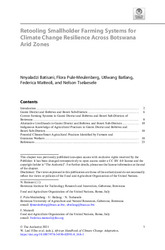| dc.contributor.author | Batisani, Nnyaladzi | |
| dc.contributor.author | Pule-Meulenberg, Flora | |
| dc.contributor.author | Batlang, Utlwang | |
| dc.contributor.author | Matteoli, Federica | |
| dc.contributor.author | Tselaesele, Nelson | |
| dc.date.accessioned | 2022-10-19T09:30:30Z | |
| dc.date.available | 2022-10-19T09:30:30Z | |
| dc.date.issued | 2021 | |
| dc.identifier.citation | Batisani, N., Pule-Meulenberg, F., Batlang, U., Matteoli, F., & Tselaesele, N. (2020). Retooling Smallholder Farming Systems for Climate Change Resilience Across Botswana Arid Zones. In African Handbook of Climate Change Adaptation (pp. 1-25). Cham: Springer International Publishing. | en_US |
| dc.identifier.issn | 978-3-030-45106-6 | |
| dc.identifier.uri | https://link.springer.com/content/pdf/10.1007/978-3-030-42091-8_168-1.pdf | |
| dc.identifier.uri | https://hdl.handle.net/13049/572 | |
| dc.description | Book Chapter | en_US |
| dc.description.abstract | Background: Scientific progress and developments in technology have improved our understanding of climate change and its potential impacts on smallholder farming systems in sub-Saharan Africa (SSA). The persistence of such smallholder farming systems, despite multiple exposures to climate hazards, demonstrates a capacity to respond or adapt. However, the scale and intensity of climate change impacts on smallholder farming systems in SSA will overwhelm any indigenous coping mechanisms developed over centuries. Therefore, there is need to co-develop resilient farming systems with farmers and extension workers in anticipation of the looming food security challenges in the midst of climate change. A survey comprising of participatory rural appraisal, focus group discussions, participatory resource mapping, and SWOT analysis was carried out for the purposes of farming systems diagnosis in reference to their resilience to climate change in three districts cutting across dry arid zones of Botswana agricultural landscape. The survey also sought to identify vulnerability of the farming systems to climate change and subsequently co-develop with farmers and extension workers new climate proofed farming systems. Results: Detailed evaluation of current systems and their strengths and weaknesses were identified. Farmers highlighted constraints to their production being mainly drought related but also lack of production inputs. These constraints are location and context specific as extension areas within a district highlighted different challenges and even different CSA practices for similar production constraints. Through participatory approaches, farmers were able to identify and rank potential climate-smart agriculture practices that could ameliorate their production challenges and subsequently developed implementation plans for these practices. Conclusions: The study demonstrates that climate change is already having significant adverse impacts on smallholder farming systems and therefore, climate proofing these systems is necessary if livelihoods of smallholder farmers are to be sustained. Therefore, retrofitting current farming systems to be climate resilient is the first step to climate proofing smallholder farmers’ livelihoods | en_US |
| dc.language.iso | en | en_US |
| dc.publisher | Springer | en_US |
| dc.subject | Botswana | en_US |
| dc.subject | Farming systems | en_US |
| dc.subject | Adaptation strategies | en_US |
| dc.subject | Climate change | en_US |
| dc.subject | Smallholder farmers | en_US |
| dc.title | Retooling Smallholder Farming Systems for Climate Change Resilience Across Botswana Arid Zones | en_US |
| dc.type | Book chapter | en_US |

